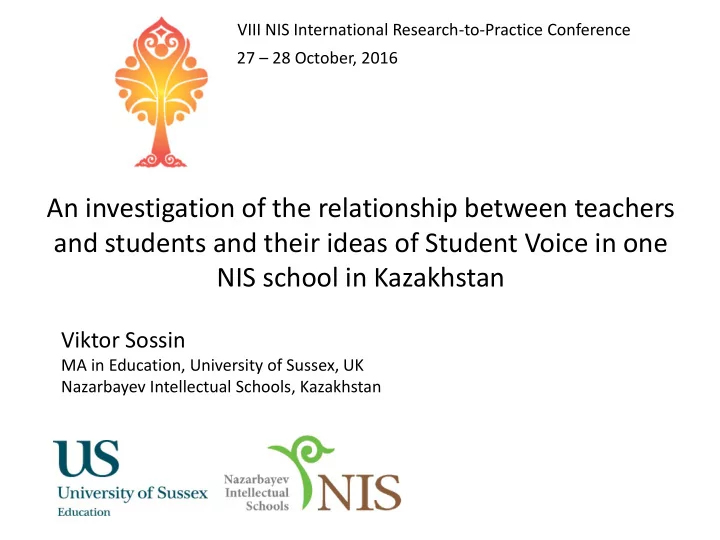

VIII NIS International Research-to-Practice Conference 27 – 28 October, 2016 An investigation of the relationship between teachers and students and their ideas of Student Voice in one NIS school in Kazakhstan Viktor Sossin MA in Education, University of Sussex, UK Nazarbayev Intellectual Schools, Kazakhstan
Context • ‘legacies of the Soviet era still pervade the Kazakhstan education system’ (McLaughlin and Ayubayeva, 2015, p.55) • ‘travelling policy’ (Silova, 2005 ) • the current reform in the education system (Bridges, 2014) • 20 NIS schools – to modernise the secondary education system in Kazakhstan (SPED, 2010) • ‘points of growth’ (Fimyar, 2014) 2
Methodology • Social constructionist paradigm Questions Design • What are teachers’ and • Lesson observations; • an interview with a students’ attitudes to ‘Student Voice’? teacher; • To what extent is Student • a group interview with Voice embraced in the students; • personal observations school? • What constitutes the during our meetings; • my personal ethnographic relationships between teachers and students? experience as a teacher 3
‘Findings’ • Talking about Student Voice... we have never heard about this... (Nina, teacher) • I mean there is no such notion as Student Voice... (Freezebee, student) • Kazakhstan ratified the Convention on the Rights of the Child in 1994 (UN, n.d.) • С urrently pupil participation is not presented in the Law about Children’s Rights in the Republic of Kazakhstan (MEoS , 2014) • A range of reforms in educational system have not emphasized the importance of Student Voice ideas 4
What do you understand by Student Voice ideas? • It is an opportunity to tell out my opinion, share my thoughts and ideas with everyone in the school , including both teachers and classmates... (Eagle, student) • So that this opinion is heard ... (Freezbee, student) • And fairly considered ... so that rights of students are not undermined... (Yelowman, student) • That is to say, democracy ... it exists indeed and applied in society as a set of unspoken norms, but not as just a written school policy... (Jackdaw, student) 5
Student identity • ...Year 12 is a special category... (Nina, teacher) • I think that the older we become the more our Voice is considered. I don’t remember such thing in Year 6 or 7... (Jackdaw, student) • It is not easy to challenge discourses of traditional power relations because these requires fundamental ‘transformation*s+ of what it means to be a student; what it means to be a teacher’ (Fielding, 2004, p.296) • Student Voice requires teachers to rethink the notion of childhood and being a student (Rudduck and Fielding, 2006) 6
• ...students should be taught how to communicate and express their opinions – everything should be taught, because otherwise we will not hear students... (Nina, teacher) • pupil consultation does not provide ‘independently constructed “voices” rather they are “the messages” created by particular pedagogic contexts ’ ( Arnot and Reay, 2007, p.317) • ‘what is done under and the name of equality, democracy and emancipation often results in its opposite in that it reproduces inequality and keeps people in their place’ (Bingham and Biesta, 2010, p.45) 7
School Voice?.. • ...respect must be here... (Nina, teacher) School School Voice?.. Students Teachers 8
‘Emerging’ School Voice • Further Research Questions: – What is a place of Students and Teachers in the power distribution in the school? – What will be affected by and Who will affect a School Voice initiative and to what end? 9
References • Arnot, M. and Reay , D. (2007) ‘A Sociology of Pedagogic Voice: Power, inequality and pupil consultation’, Discourse: Studies in the Cultural Politics of Education , 28:3, pp.311-325. • Bridges, D. (ed.) (2014) Educational Reform and Internationalisation. The Case of School Reform in Kazakhstan. Cambridge: Cambridge University Press. • Bingham, C. and Biesta, G. (2010) Jacques Ranciere: Education, Truth, Emancipation . London, New York: Continuum. • Fielding, M. (2004) ‘Transformative approaches to student voice: theoretical underpinnings, recalcitrant realities’, British Educational Research Journal , 30:2, pp.295-311. • Fimyar , O. (2014). ‘”Soviet”, “Kazakh” and “world - class” in the contemporary construction of educational understanding and practice in Kazakhstan’. In Bridges, D (ed.) Educational Reform and Internationalisation: The case of school reform in Kazakhstan. Cambridge: Cambridge University Press, pp.177-195 • Flutter, J. and Rudduck, J. (2004) Consulting Pupils: What’s in it for schools? London, New York: RoutledgeFarmer. • McLaughlin, C. and Ayubayeva , N. (2015) ‘”It is the research of self experience”: feeling the value in action research’, Educational Action Research , 23:1, pp.51-67. • MoES (2014) The Law about Children's Rights in the Republic of Kazakhstan 8 August 2002 № 345 -II [Online]. Available at: http://www.edu.gov.kz/ru/documents/zakon-respubliki-kazahstan-ot-8-avgusta- 2002-goda-no-345-ii-o-pravah-rebenka-v-respublike (Accessed: 21 July 2015) • Rudduck, J. and McIntyre, D. (2007) Improving Learning through Consulting Pupils . London, New York: Routledge. • SPED (2010) The State Program of Education Development in the Republic of Kazakhstan for 2011-2020 . 10 Available at: http://www.edu.gov.kz/en/state-program-education-development-republic-kazakhstan-2011- 2020 (Accessed: 20 August 2015).
Thank you! Viktor Sossin Mathematics Teacher MA in Education Nazarbayev Intellectual School, University of Sussex, UK Kazakhstan viktor.imo@gmail.com 11
Recommend
More recommend